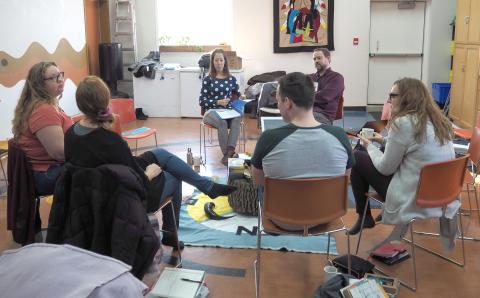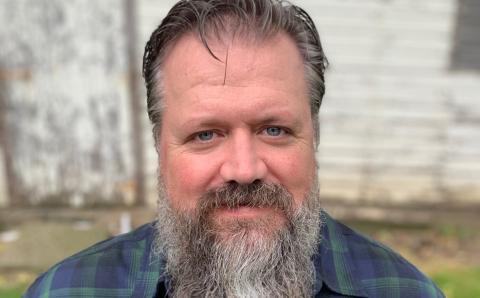Editor's note: This article was published online Nov. 25, 2020. The Christian Reformed Church's Council of Delegates has since canceled Synod 2021 and postponed synodical discussion of the human sexuality report.
A newly released report affirms the Christian Reformed Church’s historical position on homosexuality and offers scriptural and pastoral guidance on a range of sexual matters. The report is one of three coming to Synod 2021, the annual general assembly of the CRC. Four years in the making, it’s expected to dominate much of the June meeting’s agenda.
The committee behind the report was mandated by Synod 2016 to articulate a “biblical theology of human sexuality.” That synod decided that pastors may not officiate same-sex weddings. To further address the topic more broadly, Synod 2016 formed the study committee and asked it to report to Synod 2021.
The 175-page report has now been released for local churches to review and provide feedback (overtures or communications) to synod if they choose.
The report’s overall stance is, to use its own language, traditionalist. It reaffirms the CRC’s 1973 position on homosexuality: that same-sex attraction is not a sin but acting on that attraction is.
The report is notable for recommending that Synod decline to take previously discussed actions. At past synods, some suggested the CRC adopt an official confession about gender and sexuality. According to the new report, the denomination does not need such a confession. The Bible is clear, the report states, that any sexual activity outside of a male-female marriage is sinful. The report points to the Heidelberg Catechism, which in its explanation of the biblical commandment against adultery says that “God condemns all unchastity.” (Written in 1563, the Heidelberg Catechism is an official confession of the CRC and many other denominations.)
“The church’s teaching on premarital sex, extramarital sex, adultery, polyamory, pornography, and homosexual sex already has confessional status,” the report asserts, recommending that synod adopt that statement (p. 149). The report raises questions of the consequences of that action on current and future office bearers of the church but does not offer synod any answers.
No Change to Church Order
The report allows that a future synod could adopt a statement on human embodiment and sexuality such as the Great Lakes Catechism on Marriage and Sexuality, written for the Reformed Church in America in 2018. However, the report advised against appointing a committee to devise such a “quasi-confessional” statement because it would involve duplicating the work already done in the report.
In the same vein, the committee recommends that synod make no change to Article 69-c of the denomination’s Church Order, which reads, “Ministers shall not solemnize marriages which would be in conflict with the Word of God.” Adding specific wording about same-sex marriages is unnecessary, the committee says, because Article 69-c should be interpreted “in light of the biblical evidence laid out in this report.” Synod 2016 already added a supplement to Article 69-c identifying same-sex marriage as one example of a marriage considered to be in conflict with the Word of God. (Adding supplemental material to an article of Church Order is not the same as altering the order itself, which requires changes be proposed by one synod to be adopted by another.)
Committee Makeup
Eleven people, mostly seminary professors, pastors, and college professors in the CRC, were appointed to the committee. As the committee members met over the past four years, they interviewed churchgoers who represent sexual minorities. Their stories—with identities protected by pseudonyms—pepper the report.
Two of the appointed members withdrew from the work of the committee, one in February 2018 because of a move to South Korea, and the committee’s reporter, Matthew Tuininga, more recently. The introduction to the report notes that while Tuininga affirms the biblical teaching sections of the report, “he believes the pastoral care sections fail to provide the church with much-needed guidance on how to discipline erring members with love and grace and incorporate them into the sacramental community of the body of Christ” (p. 4).
Biblical Framework
The report includes a 22-page biblical theology of human sexuality that pays particular attention to the creation-fall-redemption arc of Scripture, specifically noting Matthew 19, Genesis 1-2, and passages from the wisdom literature, letters to the Corinthians, and the gospels. Under particular subject headings, the report often returns to the same Scriptures.
“Genesis 1-2 are paradigmatic texts,” the report reads. “They describe God’s purposes for creation in a way that is not simply descriptive, but normative—that is, the way God intended. Scripture itself teaches us to interpret these texts in this way.”
A later section of the report gives an in-depth analysis of Song of Songs, holding it up as a biblical example of good sex between two equally valued partners.
The committee’s mandate included “dialogue with, and potential critique of ... conclusions arising from scientific and social scientific studies.” The committee did this, it said, “through the lens of Scripture,” noting a warning from the Acts of Synod 1972 against “giving science as much weight as Scripture” (pp. 37-38).
Pornography
The report covers potentially uncomfortable and divisive topics—including pornography, gender identity, homosexuality, and disorders of sexual development—in exacting detail.
The 20-page pornography section discusses the prevalence of porn and its negative effects on porn users, their families, and those exploited to create porn. Because pornography involves violence, exploitation of the poor, racism, sexual sin, and broken relationships, the report says that it is condemned by Scripture. “Although porn usage is a deeply personal issue, as churches we can no longer allow it to be a private issue,” it states. The report includes pastoral care suggestions and many resources to help those affected by pornography.
Gender Identity
The report devotes 33 pages to gender identity. Gender dysphoria and disorders of sexual development “are to be interpreted as a result of the fall, which in many ways has distorted God’s good creation,” it states. “Of course, this does not in any way mean that the people suffering from these conditions are personally responsible for them. Rather they suffer the consequences of the post-fall groaning of creation (Rom. 8:22; John 9:1-12). The church must therefore reach out to them in compassion and love” (p. 76).
The report counters an interpretation of the first chapters of Genesis that would understand the possibilities of sexual biology as a spectrum. “Genesis 1-2 clearly and explicitly describes pre-fall human beings as created in only two forms: male/man (Adam) and female/woman (Eve). Unlike the degrees between dark and light which are found frequently in Scripture, nowhere does Scripture suggest that there is a spectrum of normative biological manifestations of humanity beyond male and female” (p. 76).
The idea of transitioning to one’s true inner gender stems from an unbiblical belief that body and soul are separate, the authors purport: “We cannot claim that a person’s true identity resides in their subjective sense of self as distinct from the body with which they were born” (p. 81).
The report does encourage Christians to reconsider traditional gender stereotypes because they can alienate gender-nonconforming people in an unbiblical way. “Although he made us with important sexual differences, God does not dictate masculine or feminine traits that ought to accompany these differences,” it states. “Biblical teaching is not nearly as specific or dogmatic as Christians have typically made it out to be. In many cases, we owe one another greater freedom than we have given in the past” (p. 82).
Citing 1 Corinthians 13:12-13, the report notes that “in its mission and pastoral care, the church should demonstrate great openness to people who experience gender dysphoria or who are gender nonconforming, and should be cautious in any pronouncements and policy making,” (p. 83).
The church can become stronger by better including “members of your congregation who see themselves as gender nonconforming, who experience gender dysphoria, or who are attracted to the same sex,” the report says. Encourage them “to advise or help give leadership to any outreach. Not only will this further their own discipleship, but the church will also benefit from the personal advocacy and compassion they will bring” (p. 90).
Singleness
Throughout the report there is pastoral advice aimed at fostering better inclusion of people in the church who are single (for any reason) and outside of traditional family structures. In fact, the report recommends referring to the church as a family and elevating the church family over the traditional family unit. Single people, it urges, should be invited into fellowship in deep, meaningful ways, such as in intentional communities.
Homosexuality
The 34-page section on homosexuality includes subsections for cultural context, Scripture, and pastoral care. While noting the conclusion of the 1973 synodical report on homosexuality that “homosexuality is not the result of any conscious choice or decision on the part of the person,” the 2020 report cites recent studies that question whether same-sex attraction is a genetic predisposition (p. 93). (It also includes an appendix titled “What Can Science Tell Us about the Biological Origins of Sexual Orientation?”) In the same section, though, the report acknowledges, “The church has also harmed people who are attracted to the same sex by promoting the false expectation of orientation change” and points out that “the sin of homosexual practice is often singled out for condemnation while other sexual sins (such as cohabitation, pornography use, adultery, and divorce without legitimate cause) are ignored or minimized” (p. 95). The report calls this hypocrisy that requires repentance.
In reviewing “biblical texts that are typically cited in any discussion of Scripture’s view of homosexual activity,” the report defends “traditional” interpretations against “revisionist” interpretations that allow for committed homosexual partnerships. It spends 16 pages (pp. 97-113) reviewing these texts and countering arguments by those whom the report terms “revisionist scholars.”
To the question of whether “the Holy Spirit is prompting a reexamination of Scripture” as suggested in the Classis Grand Rapids East study report on “Biblical and Theological Support Currently Offered by Christian Proponents of Same-Sex Marriage” (January 2016), the report responds: “It is one thing to reexamine Scripture, but it is quite another thing to ignore the clear and consistent teaching of Scripture in order to reach an alternative reading of the key texts and then claim that this all happened through the guidance of the Holy Spirit. Is it not equally possible that all this happened through the guidance of another “spirit”—the “spirit” of our secular age and contemporary culture (1 John 4:1-3)?” (p. 111).
In the conclusion of the biblical evidence section, the report asserts, “In the world’s eyes, it is outrageous to expect those who are attracted to the same sex not to express those desires in a sexual relationship, just as it is outrageous to refuse to use pornography or to refuse to have sex outside of marriage. This is why Jesus explains that in order to enter the kingdom of God a person must be born from above” (p. 113).
The pastoral care section on homosexuality calls congregations to “honestly examine their attitudes and actions toward people who are attracted to the same sex and … to repent when such attitudes and actions are sinful.” Further, “congregations need to be clearly taught or reminded that the experience of attraction to the same sex is not sinful in itself.” It adds that “the church needs more godly people who are attracted to the same sex to serve as pastors, elders, and deacons.” The report includes special sections of guidance directed to church leaders and to same-sex attracted church members.
Other matters discussed in specific sections of the report include singleness, premarital sex and cohabitation, polyamory (sexual relationships with multiple participants), and divorce.
Difficult Conversations
Given the scope of the report and the varying contexts of ministry of Christian Reformed congregations, members of the study committee worked with the CRC’s Pastor Church Resources ministry to produce a toolkit to help churches and small groups “discuss aspects of the committee’s report which may be controversial.”
Synod 2021 is expected to convene June 11-17 in Sioux Center, Iowa. This report is one of three study committee reports to be addressed. All three are available online from CRCNA synodical services, and summaries are published there in English, Korean, and Spanish.
Editor's note: On Nov. 30, 2020 one sentence was added to paragraph six of this story to mention questions raised and not answered in this report. A slight change was made to paragraph 22, removing words that introduced a quoted portion of the report.
About the Author
Roxanne VanFarowe is a freelance writer who claims both Canadian and American citizenship and grew up in the Christian Reformed Church. She is a member of Blacknall Presbyterian Church in Durham, North Carolina.





